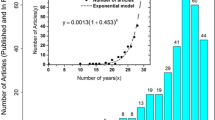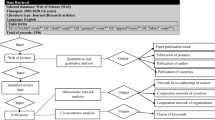Abstract
This paper presents the progress made by India and China in the field of waste management and its disposal since l996 to 2020. To access it, bibliometric analysis has been carried out using SCOPUS linked SCImago electronic database. Different bibliometric indicators such as documents, citable documents, external and self-citations, and external and self-citations per document along with their annual corresponding growth (ACG) have been calculated in order to explore the progresses made in both the countries. China has contributed 16.3% and India 4.3% to the total documents produced worldwide during 1996–2020 in waste management with the average ACG of 26.42% and 15.37%, respectively, during the same time span. Also, the average ACG for self-citations of published research documents is more than that of external citations for both the countries. In addition to that, the average self-citation magnitude reported for China (28,475) is more than that of India (5223), whereas this trend reverses in the case of average external citation per document with values 16.9 and 28.94, respectively. Moreover, the waste management practices being followed in both countries have also been compared and also presented so that it could be beneficial for the country which is relatively not good in the same.
Similar content being viewed by others
Data availability
The basic data of total publication along with their citation dynamics considered in present study are freely available at https://www.scimagojr.com.
References
Agrawal P (2015) Infrastructure in India: challenges and the way ahead. New Delhi, India
Al-Wabel MI, Al Yehya WS, AL-Farraj, A.S., El-Maghraby, S.E., (2011) Characteristics of landfill leachates and bio-solids of municipal solid waste (MSW) in Riyadh City, Saudi Arabia. J Saudi Soc Agric Sci 10:65–70. https://doi.org/10.1016/j.jssas.2011.03.009
Bernius S (2010) The impact of open access on the management of scientific knowledge. Online Information Review 34:583e603
Botello-Alvareza JE, Rivas-Garciab P, Fausto-Castro L, Estrada-Baltazar A, Gomez-Gonzalez R (2018) Informal collection, recycling and export of valuable waste astranscendent factor in the municipal solid waste management: a Latin-American reality. J Clean Prod 182:485–495
Brito Ricardo, Rodríguez-Navarro Alonso (2018) The USA is an indisputable world leader in medical and biotechnological research. J. Scientometr. Res arXiv:1807–01225
Cao Q (2020) Contradiction between input and output of Chinese scientific research: a multidimensional analysis. Scientometrics 123(451):485
Cheng HF, Zhang YG, Meng AH, Li QH (2007) Municipal solid waste fueled power generation in China: a case study of waste-to-energy in Changchun City. Environ Sci Technol 41:7509–7515
Costas R, van Leeuwen T, Bordons M (2010) Self-citations at the meso and individual levels: effects of different calculation methods. Scientometrics 82(3):517–537
Ding Y, Zhao J, Liu JW, Zhou J, Cheng L, Zhao J, Shao Z, Iris Ç, Pan B, Li X, Hu ZT (2021) A review of China’s municipal solid waste (MSW) and comparison with international regions: management and technologies in treatment and resource utilization. J Clean Prod 293:126144
EAI (2019). http://www.eai.in/ref/ae/wte/typ/clas/msw.html. Accessed date: 15 June 2021
Fan YV, Lee CT, Klemes JJ, Chua LS, Sarmidi MR, Leow CW (2018) Evaluation of effective microorganisms on home scale organic waste composting. J Environ Manag 216:41–48
Fernandez-Gonzalez JM, Grindlay AL, Serrano-Bernardo F, Rodriguez-Rojas MI, Zamorano M (2017) Economic and environmental review of waste-to-energy systems for municipal solid waste management in medium and small municipalities. WasteManag 67:360–374
Glynn RW, Chin JZ, Kerin MJ, Karl SJ (2010) Representation of cancer in the medical literature—a bibliometric analysis. PLoS ONE 5(11):e13902. https://doi.org/10.1371/journal.pone.0013902
Gupta N, Yadav KK, Kumar V (2015) A review on current status of municipal solid waste management in India. J Environ Sci 37:206–217. https://doi.org/10.1016/j.jes.2015.01.034
Hazra T, Goel S (2009) Solid waste management in Kolkata, India: practices and challenges. Waste Manag 29(1):470–478
Jayakrishnan T, Jeeja MC, Bhaskar R (2013) Occupational health problems of municipal solid waste management workers in India. Int J Environ Health Eng 2(1):42
Jin C, Sun S, Yang D, Sheng W, Ma Y, He W, Li G (2021) Anaerobic digestion: an alternative resource treatment option for food waste in China. Sci Total Environ 779:146397
Kaza, S., Yao, L., Bhada-Tata, P., Van Woerden, F., 2018. What a Waste 2.0: a Global Snapshot of Solid Waste Management to 2050. World Bank Publications
Khajuria A, Morioka T (2008) Solid waste management in Asian countries: problem and issues. WIT Trans on Ecol Environ 109:643–653
Kuhad RC, Kumar S (2020) Reimagining Indian higher education through new national education policy. UNIVERSITY NEWS 58(33):17–23
Li J, Wang MH, Ho YS (2011) Trends in research on global climate change: a science citation index expanded—based analysis. Glob Planet Change 77:13–20
Li Y, Jin Y, Borrion A, Li H (2019) Current status of food waste generation and management in China. Biores Technol 273:654–665
MacLeod WB, Urquiola M (2021) Why does the United States have the best research universities? Incentives, Resources, and Virtuous Circles.". J Econ Perspect 35(1):185–206
Mori H, Nakayama T (2013) Academic impact of qualitative studies in healthcare: bibliometric analysis. PLoS One 8(3):e57371
Meo SA, Al-Saadi M (2007) Right path of publishing a scientific paper to a right journal: academic paper based case study. Pak J Med Sci 23(6):946–949
Nagpure AS (2019) Assessment of quantity and composition of illegal dumped municipal solid waste (MSW) in Delhi. Resour Conserv Recycl 141:34–60
NBSC, 2018.China Statistical Yearbook. National Bureau of Statistics of China. http://data.stats.gov.cn/easyquery.htm?cn¼C01.
Panat R (2014) On the data and analysis of the research output of India and China: India has significantly fallen behind China. Scientometrics 100:471–481
Patil BS, Agnes AC, Singh DN (2017) Simulation of municipal solid waste degradation in aerobic and anaerobic bioreactor landfills. Waste Manag Res 35(3):301–312
Pujara Y, Pathak P, Sharma A, Govani J (2019) Review on Indian municipal solid waste management practices for reduction of environmental impacts to achieve sustainable development goals. J Enviro Manage 248:109238
Rana R, Ganguly R, Gupta AK (2019) Life-cycle assessment of municipal solid-waste management strategies in Tricity region of India. J Mater Cycles Waste Manag 21(3):606–623
Rathore P, Sarmah SP, Singh A (2019) Location–allocation of bins in urban solid waste management: a case study of Bilaspur city. India. https://doi.org/10.1007/s10668-019-00347-y
SCImago website for Country ranking (2018) Available: https://www.scimagojr.com/countryrank.php?area=2300&category=2304. Accessed 25 June 2021
Shareefdeen Z, Elkamel A, Tse S (2015) Review of current technologies used in municipal solid waste-to-energy facilities in Canada. Clean Technol Environ Policy 17(7):1837–1846
Singh S (2020) Solid waste management in urban India: imperatives for improvement. ORF Occasional Paper No. 283. Observer Research Foundation
Srivastav AL, Kumar A (2020) Review-An endeavor to achieve sustainable development goals through floral waste management: a short review. J Clean Prod. https://doi.org/10.1016/j.jclepro.2020.124669
Srivastav AL, Kaur T, Rani L, Kumar A (2019) Scientific research production of India and China in environmental chemistry: a bibliometric assessment. Int J Environ Sci Technol 16:4989–4996. https://doi.org/10.1007/s13762-019-02306-6
Sun S, Jin C, He W, Li G, Zhu H, Huang J (2021) Management status of waste lithium-ion batteries in China and a complete closed-circuit recycling process. Sci Total Environ 776:145913
Swachh Survekshan (2019) Analytics. http://swachh.city/analytics. Accessed 24 June 2021
Sweileh WM, Al-Jabi SW, Zyoud SH, Sawalha AF (2018) Outdoor air pollution and respiratory health: a bibliometric analysis of publications in peer-reviewed journals (1900–2017). Multidiscip Respir Med 13:15
Tyagi VK, Fdez-Guelfoc LA, Zhou Y, Alvarez-Gallego CJ, Romero Garcia LI, Ng WJ (2018) Anaerobic co-digestion of organic fraction of municipal solid waste (OFMSW): progress and challenges. Renew Sustain Energy Rev 93:380–399
Wambu EW, Ho YS (2016) Abibliometric analysis of drinking water research in Africa. Water SA 42(4):612–620
Watal RP, Raghavan KV (2019) R&D expenditure ecosystem. http://psa.gov.in/sites/default/files/pdf/RD-book-for-WEB.pdf. Accessed 27 June 2021
WBD (2021) The World Bank Data on Researchers in R&D (per million people). https://data.worldbank.org/indicator/SP.POP.SCIE.RD.P6?most_recent_value_desc=true. Accessed 20 Apr 2021
Yang L, Chen Z, Liu T, Gong Z, Yu Y, Wang J (2012) Global trends of solid waste research from 1997 to 2011 by using bibliometric analysis. Scientometrics 96(1):133–146
Yin J, Huang G, Xie Y, An C, Chen X (2021) An inexact two-stage multi-objective waste management planning model under considerations of subsidies and uncertainties: a case study of Baotou China. J Clean Prod 298:126873
Yuan H, Wang L, Su F, Hu G (2006) Urban solid waste management in Chongqing: challenge and opportunities. Waste Manag 26:1052–1062
Zhang L, Jahng D (2012) Long-term anaerobic digestion of food waste stabilized by trace elements. Waste Manag 32:1509–1515
Zhao Z, Pan X, Hua W (2021) Comparative analysis of the research productivity, publication quality, and collaboration patterns of top ranked library and information science schools in China and the United States of America. Scientometrics 126(2):931–950
Zhu Y, Zhang Y, Luo D et al (2021) A review of municipal solid waste in China: characteristics, compositions, influential factors and treatment technologies. Environ Dev Sustain 23:6603–6622. https://doi.org/10.1007/s10668-020-00959-9
Author information
Authors and Affiliations
Contributions
AT: Ideation and drafting of the manuscript.
ID: Review and value addition.
ALS: Critical review and revision.
Corresponding author
Ethics declarations
Ethical approval
Not applicable.
Consent to participate
Not applicable.
Consent to publish
Not applicable.
Competing Interests
The authors declare that they do not have any personal or financial conflict of interests.
Additional information
Responsible Editor: Philippe Garrigues
Publisher's note
Springer Nature remains neutral with regard to jurisdictional claims in published maps and institutional affiliations.
Rights and permissions
About this article
Cite this article
Taneja, A., Dutt, I. & Srivastav, A.L. Advances of waste management practices in India and China along with bibliometric assessment of their research outcomes. Environ Sci Pollut Res 28, 66485–66495 (2021). https://doi.org/10.1007/s11356-021-16904-w
Received:
Accepted:
Published:
Issue Date:
DOI: https://doi.org/10.1007/s11356-021-16904-w











